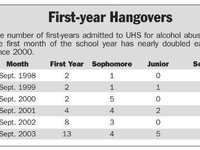Sobering Statistics
Recent spikes in UHS alcohol admissions have contributed to the sense of urgency about the alcohol situation on campus.
The 60 percent increase in admits from last September to this September includes a marked jump in the number of first-years treated for alcohol poisoning.
Of the 24 admits this September, 13 were first-years. Last September, 8 of the 15 students treated were first-years.
In at least two of this year’s 24 cases, the victims fell into comas, according to UHS statistics.
The total number of alcohol check-ins has risen in the past six years, from 18 total in the 1997-1998 school year to 123 total in the 2002-2003 academic year. The statistics show that typically UHS sees the most alcohol-related cases in November and December.
Director of UHS David Rosenthal said that he is not sure whether the increase in UHS visits is due to an increase in binge drinking or to a greater willingness to seek medical attention.
Only in recent years has the administration made it clear that there are no disciplinary repercussions for check-ins that are purely alcohol-related, Rosenthal said.
Hyman said that while he does not believe Harvard’s drinking problem is bad compared to other schools in the United States, “the problem is bad enough to be taken seriously.”
“It’s very discouraging,” Hyman said. “We obviously don’t have our messages down right. We have to address these problems more clearly and effectively.”
Road to Recommendations
“One thing we might want to teach is how students can learn to read the signals from their own body that they’ve had enough,” Hyman said.
Hyman, who will sit on the committee, said that he hopes that there will be concrete changes made at the end of the year.
“Obviously we can do both education and treatment, but I think the issue is doing education in a certain way,” Hyman said. “We are starting from the position that students carry understanding about alcohol but don’t always act on it.”
Hyman also stressed the importance of creating an “alliance” of House masters, tutors, doctors and students in order to coordinate efforts at prevention and response.
Read more in News
Black Female Alums Celebrate Third Decade













